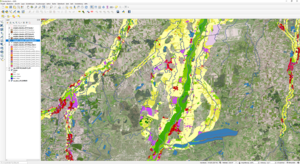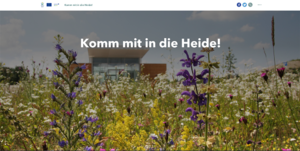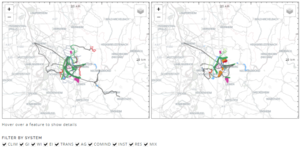WAVE Seminar Geodesign Tutorials
Geodesign
| "Geodesign is changing geography by design.” Steinitz 2010 |
| "Geodesign is a design and planning method which tightly couples the creation of a design proposal with impact simulations informed by geographic context and systems thinking normally supported by digital technology.”
Flaxman 2010, amended by Stephen Ervin |
In other words, geodesign is a participatory planning approach, which is based on 1) Thinking in scenarios 2) Informing the workshop process through geoinformation 3) Conducting a structured process with diagram creation, synthesis, assessment and negotiations. For an outlook into the future of geodesign, please refer to the following video of a keynote by Jack Dangermond in 2020:
{{#evu:https://www.youtube.com/watch?v=eEhPMV37tm0
|alignment=inline
|dimensions=700
|description= Keynote on geodesign by Jack Dangermond 2020
}}
Open Geodata Theory
An introductory lecture about "open geodata" is under construction. Until then, I would like to refer you to the following, excellent (but partly in German) open online course, which is funded by the German government: OpenGeoEdu
Open Geodata on Watersheds in Europe
Copernicus Europe´s Eyes on Service
Copernicus land services need both satellite images and in-situ data in order to create reliable products and services.
Satellite imagery forms the input for the creation of many information products and services, such as land cover maps or high resolution layers on land cover characteristics. Having all the satellite imagery available to cover 39 countries of EEA (EEA39), the individual image scenes have been processed into a seamless pan-European ortho-rectified mosaics. The Copernicus Land Monitoring Service also provides access to Sentinel-2 Global Mosaic service.
EU-DEM is a pan-European digital surface model and EU-Hydro provides a photo-interpreted river network and a modelled drainage network for EEA39 countries.
{{#evu:https://www.youtube.com/watch?v=59yRymzrspc
|alignment=inline
|dimensions=700
|description= How to download the EU-Hydro dataset
}}
OpenStreetMap
OpenStreetMap (OSM) is a collaborative "Citizen Science" project to create open source editable maps. Completeness and accuracy of the data vary across different regions but generally, they are not worse than most commercial products as several studies showed. Using the geofabrik download service, it is particularly easy to extract building footprints, roads, waterways and much more as Shapefiles (.shp) for the use in ArcGIS or QGIS.
{{#evu:https://www.youtube.com/watch?v=dIcSIlOn8UE
|alignment=inline
|dimensions=700
|description= Downloading OpenStreetMap data
}}
Wasser-DE
Access to digital data, figures and facts about existing websites of the federal government, the states and the river basin communities.
Link to Wasser-DE, the central information node for water management in Germany
StoryMaps as interactive visual tools to Storytelling in Geodesign
ESRI Story Map is a tool for the presentation of interactive online maps based on geospatial data as narrative and enriched with various visual media by ESRI. Previous research suggests that this presentation form has high potentials to facilitate the understanding of complex spatial topics. Although the code is not open source, the use is for free.
Selected examples of StoryMaps addressing landscape questions
Ecopolitical Story Maps Collection
2020 StoryMaps Competition Award Winners
National Geographic Explorer StoryMaps
Komm mit in die Heide! - A StoryMap about the heather landscape north of Munich
Getting started with StoryMaps
A basic guide to using the StoryMaps Editor
StoryMaps Resources to Creating Your Own StoryMap
Literature
Schroth, O., & Mertelmeyer, L. (2020). Telling the Story of a Landscape Plan Online Literature: Representing Landscape Planning. Journal of Digital Landscape Architecture, 5, 558–566. https://doi.org/10.14627/537690057
Geodesignhub as process-oriented collaborative tool for geodesign workshops
Geodesignhub is a map-based project management software that facilitates negotiations and implementation of negotiated outcomes. It was implemented by Hrishi Ballal, PhD student of Carl Steinitz, and allows any maps of the project area to be seen at several scales with prepared underlying data. On this basis, policies and projects can be located and designed collaboratively in the form of simple diagrams. Geodesignhub


